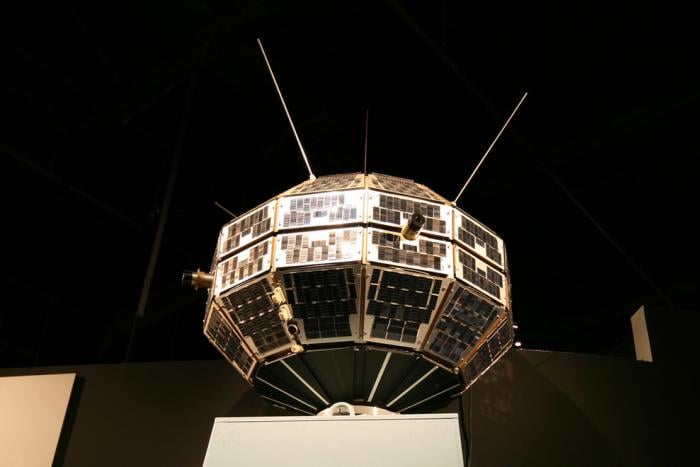It's strange to say that any one grocery store is beautiful, but the Loblaws at Maple Leaf Gardens is a bizarre and gorgeous monument. But who doesn't appreciate good clean architecture and delight in the sight of prosciutto hams displayed behind near-museum-quality glass? On Tuesday morning the well-dressed literati sat expectantly in rows on (presumably reproductions of) Phillipe Starks's clear Ghost Louis chairs, waiting to hear which of Canada's creative non-fictionists would make the shortlist for the Hilary Weston Writer's Trust prize. The audience was nestled in between the aforementioned luxurious hams and clear glass jars of organic soups and stews. Being that everyone was there to celebrate non-fiction, transparency proved a fitting, though possibly accidental, decorative theme.
Don Oravec, president of the Writer's Trust, remarked approvingly on the size of the crowd. The prize, which has been sponsored since last year in large part by former Lieutenant Governor General Hilary Weston, awards $5,000 to each finalist and $60,000 to the winner, making it the highest stakes prize for creative non-fiction in Canada. After introducing the jury, The Honourable Mrs. Weston, whose family owns Loblaws, described the prize's power beyond its significant pay out, saying that previous winners and finalists have benefited from the attention that comes with the award. She made special mention of Charlotte Gill, who sits on this year's jury and whose book Eating Dirt went on to win the B.C. Books Prize, and find a home at both the top of the Globe and Mail's and iTune's bestseller lists, among other honours. Weston, careful not to detract from Gills's talent, said that she hoped the notice garnered by last year's shortlist acted as “the match that lit the rocket.” Gills then introduced the first finalist via FaceTime, and was followed IRL by her co-jurors Marni Jackson and James Bartlemen.
The finalists:
Kamal Al-Solaylee, who may be familiar to some as the former Globe and Mail theatre critic, for Intolerable: A Memoir of Extremes (HarperCollins Publishers). The book describes Al-Solaylee's Middle Eastern family and the process of his coming out to his loved ones. In an interview with Extra, Al-Solaylee described himself as a supporting character in his own memoir: “I only exist in relationship to my family, it's about coming out as a gay man in the Middle East and pursuing the life I wanted for myself.” An excerpt of the memoir appears in the most recent issue of Folio from Ryerson University, where Al-Solaylee is presently a director for the undergraduate journalism program. The Globe's review calls Intolerable “everything a memoir should be.”
Modris Eksteins, a professor of history at the University of Toronto, for Solar Dance: Genius, Forgery, and the Crisis of Truth in the Modern Age (Knopf Canada). The book plumbs the history of a shady art conman, Otto Wacker, purveyor of fraudulent masterpieces he claimed were created by Vincent Van Gogh. In a Macleans profile, Eksteins quips that there is “nothing more deadly than certainty.” The Literary Review of Canada gave the work a thoroughly positive appraisal, and Jeet Heer, in his review for the National Post, described the book as compulsively readable and deserving of a wide readership. Based on Weston's opening remarks about the wider effect of her prize, it seems reasonable to expect that this last is in order.
Taras Grescoe—whose previous work, Bottomfeeder, was awarded the 2008 Writer's Trust Non-Fiction prize—for Straphanger: Saving Our Cities and Ourselves from the Automobile (HarperCollins Publishers). During the applause for this particular announcement, Mark Medley—who interviewed Grescoe for the Post—whispered to me that Straphanger was one of the best books he's read this year. Part anti-automobile polemic, part travelogue, Grescoe's book looks at the health (some dire, some positive) of public transit systems around the world from the vantage point of an advocate. It was excerpted on The Takeaway in the US. Ken McGoogan called this one early, singling Straphanger out as worthy of nomination for non-fiction awards back in his April review.
JJ Lee, who also appears on the shortlist for the Governor General's and the Charles Taylor awards, for The Measure of a Man: The Story of a Father, a Son, and a Suit (McClelland & Stewart). Having written an interwoven memoir of his father's death, the suiting business, and his own changing wardrobe, Lee acknowledges that The Measure of a Man is a lot like “an act of tailoring,” stitching together disparate elements, in an interview with the CBC. Excerpted in both The Huffington Post and Maclean's, and heralded as a “a beautiful, cleverly executed story” by Carla Luchetta in the Globe, it seems fitting that Lee's personal story about the cultural history of the suit is one of this year's most decorated books.
Candace Savage, celebrated nature writer and prairie historian, for Geography of Blood: Unearthing Memory from a Prairie Landscape (Greystone). In his review of this memoir about the buried history of South Western Saskatchewan's Cypress Hills, Philip Marchand wrote about the pleasurable pantheism Savage's work exudes. In the Globe's review, Brett Josef Grubisic describes the book as an artful blending of genres, “travelogue, memoir, detective story, philosophy and history.” Savage's publisher has made an excerpt available on their website.
In a surprise twist, two extra jurors were brought in to help choose among the finalists, Seamus O'Regan and Barbara Amiel Black, presumably to inject a some celebrity into the proceedings. Black, a columnist with Maclean's, said that too often non-fiction seems a bit like the unloved step child of literature, without the lyrical provenance of prose or poetry. Observing that money, prize money, validates writing, she went on to say that literary non-fiction matters a great deal.
The winner of the Hilary Weston Writer's Trust Prize for Liteary Non-Fiction will be announced in Toronto on November 12th, 2012.






